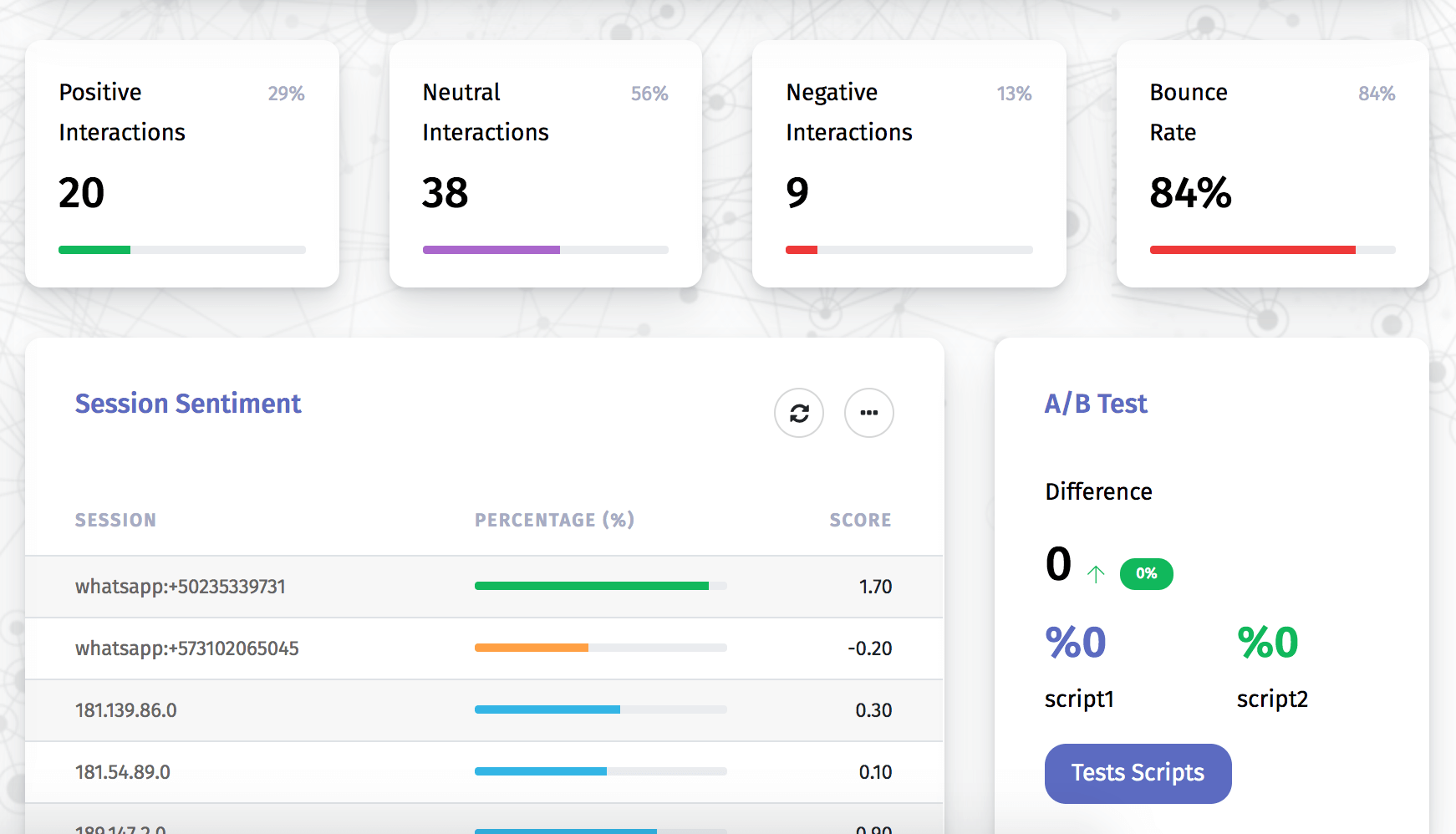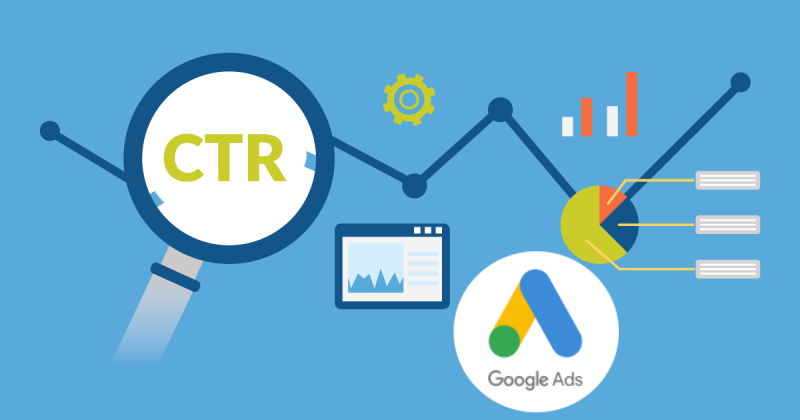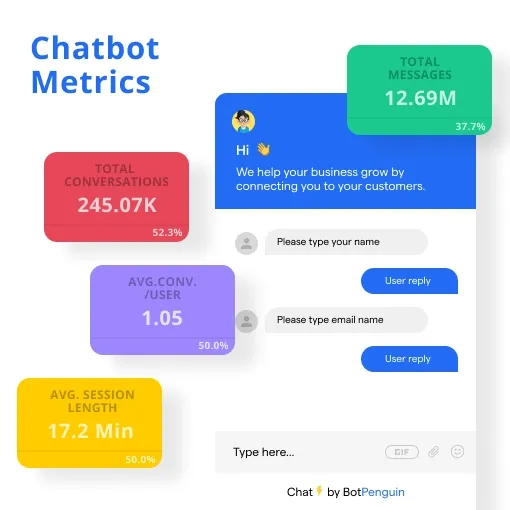What are chatbot metrics?

Chatbot Metrics refer to the various data points and measurements that help businesses understand how their chatbots perform.
Chatbot Metrics are essential for businesses to optimize and improve their chatbots, increase engagement, and achieve better outcomes.
This glossary page will explore the various Chatbot Metrics, their importance, and how to track them.
Importance of Chatbot Metrics:
Chatbot metrics help us understand how well our chatbots are performing.
By tracking metrics, you can identify areas for improvement and optimize the chatbot's performance.
Chatbot metrics also help businesses evaluate their chatbots' return on investment (ROI) and justify the investment made in chatbot technology.
Common Chatbot Metrics:
1. Engagement Metrics:
User Interactions: The number of times a user interacts with a chatbot. It includes sending messages, clicking on buttons, and selecting options.
Example: A user interacts with a chatbot 10 times during a conversation to book a hotel room.
2. User Satisfaction
The level of satisfaction of users with their chatbot experience. It is usually measured through post-conversation surveys.
Example: A user rates their chatbot experience as a 4 out of 5 in a post-conversation survey.
3. Message Open Rate
The percentage of messages users open in a chatbot conversation.
Example: Out of 100 messages sent by the chatbot, 80 messages were opened by users.
4. Message Response Rate
The percentage of messages users respond to in a chatbot conversation.
Example: Out of 100 messages sent by the chatbot, 50 messages were responded to by users.
Operational Metrics:
1. Uptime
The percentage of time a chatbot is available to users.
Example: A chatbot is available to users 99% of the time.
2. Error Rate
The percentage of errors users encounter in a chatbot conversation.
Example: Out of 100 conversations, 5 conversations encountered errors.
3. Latency
Latency is a chatbot's time to respond to a user message.
Example: A chatbot takes 2 seconds to respond to a user message.
Business Metrics:
1. Cost per Conversation
The total cost of operating a chatbot divided by the number of conversations handled.
Example: The cost of operating a chatbot for a month is $1000. The chatbot handled 100 conversations, so the cost per conversation is $10.
2. Conversion Rate
The percentage of users who complete a desired action in a chatbot conversation.
Example: Out of 100 users who started a conversation, 20 completed the desired action.
3. Return on Investment
The return on investment is the net profit ratio to the investment cost.
Example: The net profit generated by a chatbot is $5000, and the cost of investment is $1000, so the return on investment is 5.
4. Customer Lifetime Value
The total value a customer brings to a business over their lifetime.
Example: A customer spends $1000 on a business in their lifetime.
5. Conversion Rate
It measures how many users completed a specific action, such as purchasing after interacting with a chatbot. This metric is particularly important for e-commerce businesses using chatbots to sell products.
Example: If a chatbot sends a product recommendation and the user clicks on the link and makes a purchase, that would be a conversion.
Advanced Chatbot Metrics
NLP Metrics
NLP metrics measure the accuracy of natural language processing, which chatbots use to understand and interpret user messages.
1. Intent Recognition Rate
It measures the percentage of user messages accurately classified by the chatbot according to their intended purpose.
Example: If a user asks a chatbot for the weather, the intent recognition rate would measure the percentage of times the chatbot correctly identifies the user's intent.
2. Entity Extraction Accuracy
Entity extraction accuracy measures the chatbot's ability to identify and extract specific information from user messages, such as names or dates.
Example: If a user asks a chatbot to schedule a meeting on Tuesday, the entity extraction accuracy would measure the percentage of times the chatbot correctly identifies "Tuesday" as the requested date.
Sentiment Analysis
Sentiment analysis measures user messages' tone and emotional content to help chatbots respond appropriately.
Example: If a user sends a message expressing frustration, the sentiment analysis metric would measure the chatbot's ability to identify and respond to the user's negative tone.
3. Channel-Specific Metrics
Channel-specific metrics measure the performance of chatbots across different communication channels, such as Facebook Messenger or WhatsApp.
Chatbot usage by channel
This metric measures the number of users who engage with a chatbot through each communication channel.
Example: If a chatbot is available on Facebook Messenger and WhatsApp, this metric would measure the number of users interacting with the chatbot through each channel.
4. Click-Through Rate

Click-through rate measures the percentage of users who click on links or calls to action provided by the chatbot.
Example: If a chatbot provides a link to a product page, the click-through rate would measure the percentage of users who click.
Pageviews
Pageviews measure the number of times users view a specific page or section of a website after interacting with a chatbot.
Example: If a chatbot provides a link to a blog post, the pageviews metric would measure the number of times users view the blog post after clicking on the link.
5. Chatbot-Specific Metrics
Chatbot-specific metrics measure the effectiveness of chatbots in providing a positive user experience.
Abandonment Rate
It measures the percentage of users who abandon a chatbot conversation without completing the intended action.
Example: If a chatbot provides a link to a product page, the abandonment rate would measure the percentage of users who exit the conversation without clicking on the link.
6. Conversation Completion Rate
It measures the percentage of users who complete a chatbot conversation to achieve the intended goal.
Example: If a chatbot provides a form for users to fill out, the conversation completion rate would measure the percentage of users who complete and submit the form.
Escalation Rate:
It refers to the percentage of conversations escalated to a human agent.
Escalation can occur when a chatbot cannot answer a user's question or when a user requests to speak with a human agent.
For example, if a chatbot had 100 conversations in a day and 20 were escalated to a human agent, the escalation rate would be 20%.
Escalation rate can help businesses identify areas where their chatbot needs improvement or where they need to add additional training or resources for their human agents.

